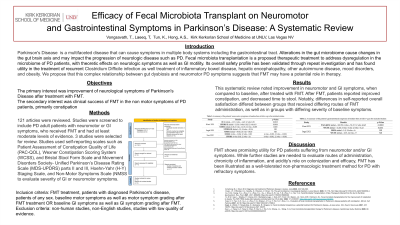Tuesday Poster Session
Category: Colon
P3008 - Efficacy of Fecal Microbiota Transplant on Neuromotor and Gastrointestinal Symptoms in Parkinson's Disease: A Systematic Review
Tuesday, October 24, 2023
10:30 AM - 4:00 PM PT
Location: Exhibit Hall

Has Audio

Tahne Vongsavath, DO
Kirk Kerkorian School of Medicine
Las Vegas, NV
Presenting Author(s)
Tahne Vongsavath, DO1, Tooba Laeeq, MD2, Kyaw Min Tun, DO3, Annie S.. Hong, MD1
1Kirk Kerkorian School of Medicine, Las Vegas, NV; 2University of Nevada, Las Vegas, Henderson, NV; 3Kirk Kerkorian School of Medicine at UNLV, Las Vegas, NV
Introduction: Parkinson's Disease (PD) is a multifaceted disease that can cause symptoms in multiple body systems including the gastrointestinal (GI) tract. Alterations in the gut microbiome cause changes in the gut brain axis and may impact the progression of neurologic disease such as PD. Fecal microbiota transplantation (FMT) is a proposed therapeutic treatment to address dysregulation in the microbiome of PD patients, with theoretic effects on neurologic symptoms as well as GI motility. Its overall safety profile has been validated through repeat investigation and has found utility in the treatment of recurrent Clostridium Difficile infection as well treatment of inflammatory bowel disease, hepatic encephalopathy, other autoimmune disease, mood disorders, and obesity. We propose that this complex relationship between gut dysbiosis and neuromotor PD symptoms suggests that FMT may have a potential role in therapy.
Methods: 121 articles with information pertaining to PD and FMT were reviewed. Studies were screened to include PD adult patients with neuromotor or GI symptoms, who received FMT and had at least moderate levels of evidence. At the final stage 3 studies were selected for systematic review. Studies used self-reporting scales such as Patient Assessment of Constipation Quality of Life (PAC-QOL), Wexner Constipation Scoring System (WCSS), and Bristol Stool Form Scale and Movement Disorders Society- Unified Parkinson’s Disease Rating Scale (MDS-UPDRS) parts II and III, Hoehn-Yahr (H-Y) Staging Scale, and Non-Motor Symptoms Scale (NMSS to evaluate severity of GI or neuromotor symptoms, with increasing scores indicating more severe symptoms.
Results: This systematic review noted improvement in neuromotor and GI symptoms, when compared to baseline, after treated with FMT. After FMT, patients reported improved constipation, and decreased time to stool. Notably, differences in self-reported overall satisfaction differed between groups that received differing routes of FMT administration, as well as in groups with differing severity of baseline symptoms.
Discussion: FMT shows promising utility for PD patients suffering from neuromotor and/or GI symptoms. While further studies are needed to evaluate routes of administration, chronicity of inflammation, and acidity's role on colonization and efficacy, FMT has been illustrated as a well-tolerated non-pharmacologic treatment method for PD with refractory symptoms.
Disclosures:
Tahne Vongsavath, DO1, Tooba Laeeq, MD2, Kyaw Min Tun, DO3, Annie S.. Hong, MD1. P3008 - Efficacy of Fecal Microbiota Transplant on Neuromotor and Gastrointestinal Symptoms in Parkinson's Disease: A Systematic Review, ACG 2023 Annual Scientific Meeting Abstracts. Vancouver, BC, Canada: American College of Gastroenterology.
1Kirk Kerkorian School of Medicine, Las Vegas, NV; 2University of Nevada, Las Vegas, Henderson, NV; 3Kirk Kerkorian School of Medicine at UNLV, Las Vegas, NV
Introduction: Parkinson's Disease (PD) is a multifaceted disease that can cause symptoms in multiple body systems including the gastrointestinal (GI) tract. Alterations in the gut microbiome cause changes in the gut brain axis and may impact the progression of neurologic disease such as PD. Fecal microbiota transplantation (FMT) is a proposed therapeutic treatment to address dysregulation in the microbiome of PD patients, with theoretic effects on neurologic symptoms as well as GI motility. Its overall safety profile has been validated through repeat investigation and has found utility in the treatment of recurrent Clostridium Difficile infection as well treatment of inflammatory bowel disease, hepatic encephalopathy, other autoimmune disease, mood disorders, and obesity. We propose that this complex relationship between gut dysbiosis and neuromotor PD symptoms suggests that FMT may have a potential role in therapy.
Methods: 121 articles with information pertaining to PD and FMT were reviewed. Studies were screened to include PD adult patients with neuromotor or GI symptoms, who received FMT and had at least moderate levels of evidence. At the final stage 3 studies were selected for systematic review. Studies used self-reporting scales such as Patient Assessment of Constipation Quality of Life (PAC-QOL), Wexner Constipation Scoring System (WCSS), and Bristol Stool Form Scale and Movement Disorders Society- Unified Parkinson’s Disease Rating Scale (MDS-UPDRS) parts II and III, Hoehn-Yahr (H-Y) Staging Scale, and Non-Motor Symptoms Scale (NMSS to evaluate severity of GI or neuromotor symptoms, with increasing scores indicating more severe symptoms.
Results: This systematic review noted improvement in neuromotor and GI symptoms, when compared to baseline, after treated with FMT. After FMT, patients reported improved constipation, and decreased time to stool. Notably, differences in self-reported overall satisfaction differed between groups that received differing routes of FMT administration, as well as in groups with differing severity of baseline symptoms.
Discussion: FMT shows promising utility for PD patients suffering from neuromotor and/or GI symptoms. While further studies are needed to evaluate routes of administration, chronicity of inflammation, and acidity's role on colonization and efficacy, FMT has been illustrated as a well-tolerated non-pharmacologic treatment method for PD with refractory symptoms.
Disclosures:
Tahne Vongsavath indicated no relevant financial relationships.
Tooba Laeeq indicated no relevant financial relationships.
Kyaw Min Tun indicated no relevant financial relationships.
Annie Hong indicated no relevant financial relationships.
Tahne Vongsavath, DO1, Tooba Laeeq, MD2, Kyaw Min Tun, DO3, Annie S.. Hong, MD1. P3008 - Efficacy of Fecal Microbiota Transplant on Neuromotor and Gastrointestinal Symptoms in Parkinson's Disease: A Systematic Review, ACG 2023 Annual Scientific Meeting Abstracts. Vancouver, BC, Canada: American College of Gastroenterology.
